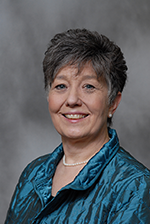
Introduction by Barbara Brandt
In 2016, in a standing room only workshop at All Together Better Health at Oxford University, I was mesmerized by how two unlikely colleagues had come to know one another and began working together to create experiences that demonstrate and teach about the importance of art in storytelling and raising awareness of the uncertainty and complexity of living with a chronic illness.
As many of you know, based upon my father’s experiences with health care, embracing the role of patients, families and community in IPE is a personal journey for me. I have spent years balancing my professional commitment to advancing interprofessional practice and education with my personal responsibilities caring for my aging father.
Since 2016, Ted Meyer and Shelley Cohen Konrad have continued to work together. In 2017, I invited them to participate in our Nexus Summit with a special eye toward how to support what the National Center is substantively planning for and implementing a strategy for patients, families and communities. Their vision and experience is guiding this year’s focus on patients during the Nexus Summit. I encourage you to engage.
Here is their story.
Shelley Cohen Konrad and Ted Meyer serendipitously met 5 years ago in Ted’s Los Angeles artist loft. “My nephew Rob, Ted’s publisher at the time, thought our interest in patient art and narrative would be a good topic for conversation. So, on a quick trip to LA from Maine to visit family, I made time to meet Ted and see his studio. I thought it would be a one-time thing.” Shelley began collecting artworks to heal after a family tragedy. “I couldn’t quite explain it and still can’t," she says. “I’m simply moved by certain works and am comforted when surrounded by them.” Her passion for art’s voice eventually made its way into her professional life, first as a clinical social worker and now as a professor, where she infuses art into her teaching methods with a range of health professions students. As an offshoot of their work together, Shelley recently became involved in an international roundtable of social workers exploring the arts and social work education, advocacy, and practice.

Ted’s life experience in the patient community as a sick kid, artist, and storyteller unexpectedly led him to positions at both UCLA and USC. He continues as a curator of art shows at USC that highlight the work of patient artists illuminating the mostly unrecognized exigencies of illness and telling their life stories. Ted also developed a lecture series pairing patient artists with medical specialists.
Ted’s 20 year project, “Scarred for Life, Every Scar Tells a Story” has traveled the world, exhibiting in museums and galleries and sharing the survival stories of people with life altering scars.
He was lucky enough to present at TEDMED mainstage where he discussed how his illness lead him to a life of art and storytelling and to his position as Artist in Residence at medical schools.
It was immediately clear that Shelley and Ted had common passions though they were coming at them from different yet complementary life perspectives: Shelley as a mother and traditional educator; Ted as a lifelong patient, artist, and curator. Their chance meeting blossomed into an ongoing bi-coastal partnership – one that seeks to use art as a medium for understanding patient standpoints and for educating current and future health professionals about the critical importance of listening, learning, compassion, and healing.

Ted and Shelley view patient art as essential to health education curriculum. As Ted explains, “Showing patient art to health professions students early in their training gives them a more complex and complete view of the patient experience; one that will help them not only connect with future patients but also lead to more effective care.”
The pair has presented at national and international conferences including All Together Better Health in Oxford and CAB V in Roanoke. Together they speak to how words, voice, and pictures bring fuller understanding to providers about their patients’ experiences. Shelley says, “Seeing through the eyes of patients contributes to empathic appreciation for how illness and disability affects people’s circumstances and worldviews.” Such understanding, she believes, improves communication between patients, families, and health care teams. As Ted says, “Symptoms can tell you about a moment in time, but a good story or painting can tell you about a lifetime.”
**************************
As part of Nexus Summit 2018, Shelley and Ted will be presenting a short course titled Visualizing the Patient Experience: Exploring the Benefits of Using Art and Expression to Teach and Treat on Sunday, July 29.
The National Center is accepting submissions to the Patient Experience Art Show through June 15, 2018. Submissions have begun to arrive and are available to view online before the Summit. Submissions will be updated online regularly prior to display at Nexus Summit 2018.
